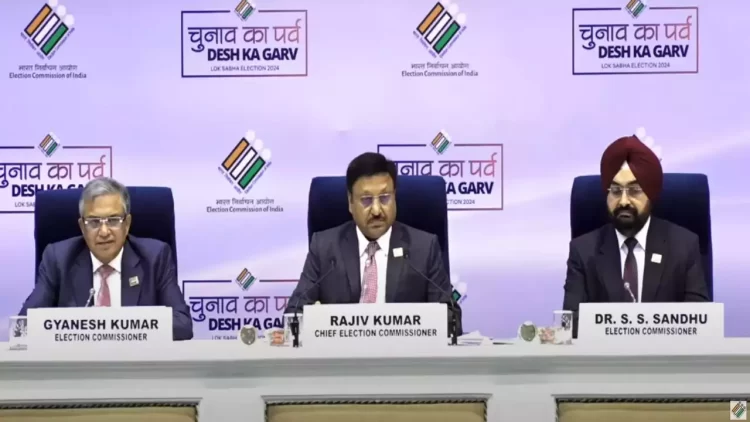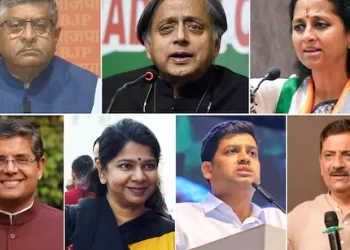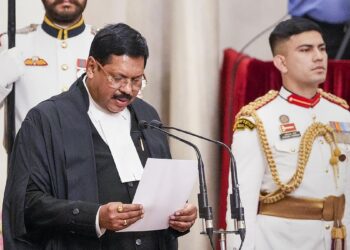The Chief Election Commissioner, Rajiv Kumar, announced the dates for the upcoming Lok Sabha elections today. The elections will take place over the course of seven phases, beginning on April 19 and ending on June 1. The results will be declared on June 4, twelve days before the term of the current House expires on June 16. Additionally, he announced that the assembly elections for Odisha will be held on May 13, Andhra Pradesh on May 13, and Sikkim and Arunachal Pradesh on April 19.
Approximately 97 crore people are able to cast votes in the next elections. Voting from home will be permitted for anyone over the age of 85. The Election Commission guaranteed that all polling places will have access to essential amenities including drinking water and toilets.
The tenure of the existing Lok Sabha expires on June 16, and a new House needs to be established before then. June also marks the end of the terms for four state assemblies.
With the announcement of the poll schedule, the Model Code of Conduct (MCC), which bars the government in power from announcing any new decisions, comes into effect immediately.
Simultaneous assembly elections are planned for Andhra Pradesh, Arunachal Pradesh, Odisha, and Sikkim. On May 13, votes will be cast for the 175 assembly seats in Andhra Pradesh. On April 19, elections are planned in Arunachal Pradesh and Sikkim. Odisha’s elections are scheduled to take place in four stages from May 13 to June 1. On June 4, along with the results of the Lok Sabha elections, the results of all four state elections will be announced.
However, the Election Commission decided against holding the J&K state polls at the same time for security reasons.
The terms of the Andhra Pradesh, Arunachal Pradesh, Odisha and Sikkim assemblies will end on June 11, June 2, June 24 and June 2, respectively.
The Election Commission also announced bye-elections to 26 Assembly seats across states.
West Bengal, Bihar, and Uttar Pradesh will have the longest seven-phase voting schedule for the Lok Sabha elections. Subsequently, there are five phases for Maharashtra and Jammu & Kashmir; four phases for Jharkhand, Madhya Pradesh, and Odisha; three phases for Assam and Chhattisgarh; and two phases for Karnataka, Manipur, Rajasthan, and Tripura. Election day will come for all of the remaining states and Union Territories combined.
The first phase of elections on April 19 covers the maximum number of states — 102 constituencies across 21 states. 13 states and 89 constituencies will be covered in the second round, which begins on April 26. On May 7, 94 constituencies across 12 states will be covered in the third phase. On May 13, 96 seats across 10 states will be covered. On May 20, 49 seats across eight states will go to the polls in the fifth phase. On May 25, 57 seats in seven states will host the sixth phase, and on June 1, 57 seats in eight states will host the seventh phase.
Chief Election Commissioner (CEC) Rajiv Kumar said at the press conference that over 97 crore people are eligible to vote in the next Lok Sabha elections at 10.5 lakh polling stations. More than 55 lakh electronic voting machines (EVMs) will be used.
49.7 crore voters are male, 47.1 crore are female, 1.8 crore are first-time voters, 19.74 crore are young voters, 82 lakh voters are over 85, 88.4 lakh are people with disabilities (PwDs), 19.1 lakh are service electors, 48,000 are transgender people, and 2.18 lakh are centenarians.
CEC Rajiv Kumar went on to say that the Election Commission has taken all necessary precautions to prevent corruption during the voting process by monitoring four key areas: money power, muscle power, disinformation, and transgressions of the model code of conduct. He claimed that a merciless campaign against vote violence had been initiated by the election panel.
The previous Lok Sabha elections took place in seven phases starting on April 11 and were declared on March 10. May 23 was election day.
The BJP secured 303 seats and the Congress secured 52 seats in the most recent parliamentary elections. It was unable to gather enough support to run for Leader of the Opposition in the Lok Sabha.
Source:IE







 Finance
Finance







